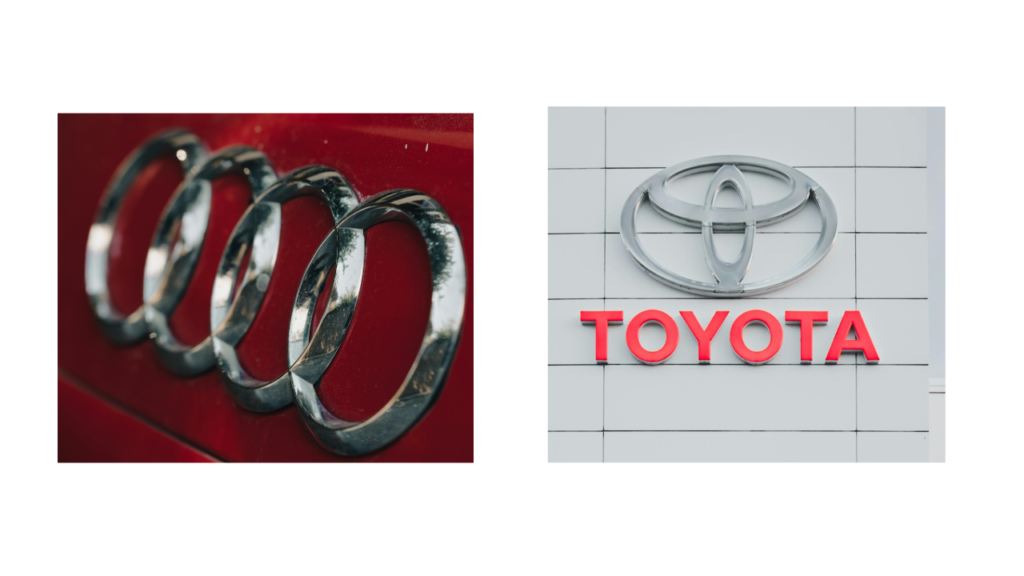In This Guide
When evaluating automotive brands, Toyota and Audi represent two distinct philosophies: Toyota emphasizes reliability and affordability, while Audi focuses on luxury and performance. Deciding which brand is “better” depends on individual priorities and preferences. This comprehensive analysis will delve into various aspects of both manufacturers to provide a nuanced comparison. Is Toyota better than Audi?
1. Brand Philosophy and Heritage
Toyota, established in 1937, has built a reputation for producing durable and economical vehicles. The brand’s commitment to quality and longevity has garnered a loyal customer base worldwide. Audi, founded in 1909, is synonymous with luxury, advanced technology, and high-performance vehicles. Its slogan, “Vorsprung durch Technik” (Advancement through Technology), reflects its dedication to innovation.
2. Reliability and Durability
Reliability is a cornerstone of Toyota’s appeal. Models like the Corolla and Camry are renowned for their longevity, often surpassing 200,000 miles with proper maintenance. In contrast, Audi vehicles, while well-engineered, may require more frequent maintenance as they age. Consumer Reports consistently ranks Toyota higher in reliability compared to Audi.
3. Performance and Driving Experience
Audi excels in delivering a dynamic driving experience. With models like the S and RS series, Audi offers powerful engines, precise handling, and a refined ride. The Quattro all-wheel-drive system enhances performance, especially in adverse conditions. Toyota, while offering capable vehicles, generally does not match Audi’s performance levels.
4. Interior Quality and Features
Audi interiors are characterized by high-quality materials, advanced infotainment systems, and meticulous attention to detail. Features like the Virtual Cockpit and MMI Touch Response system exemplify Audi’s commitment to luxury. Toyota interiors, though functional and comfortable, may not offer the same level of sophistication or technological innovation.
5. Safety
Both brands prioritize safety, equipping their vehicles with a suite of advanced safety features. Toyota often includes more standard safety equipment across its lineup, such as Toyota Safety Sense, which encompasses adaptive cruise control, lane-keeping assist, and pre-collision systems. Audi offers similar features, often as part of optional packages or higher trims.
6. Cost of Ownership
Toyota vehicles generally have a lower purchase price and are more economical to maintain. They also depreciate at a slower rate, retaining their value better over time. Audi vehicles, while offering a premium experience, come with higher initial costs and maintenance expenses. Additionally, Audi models may depreciate faster than Toyota models.
7. Environmental Considerations
Toyota has been a pioneer in hybrid technology with models like the Prius, contributing to reduced emissions and better fuel efficiency. Audi is also advancing in this area, offering hybrid and electric models such as the e-tron series, though Toyota has a longer history in hybrid technology.
8. Global Presence and Market Perception
Toyota’s reputation for reliability has made it a top choice in markets like the United States and Japan. Audi’s luxury appeal has garnered a strong following in Europe and among consumers seeking premium vehicles. In Germany, for instance, Audi is considered the most popular automotive brand, reflecting its strong market presence.
9. Model Comparisons
To provide a clearer perspective, let’s compare specific models from both brands:
- Toyota Corolla vs. Audi A3: The Toyota Corolla is known for its reliability, fuel efficiency, and affordability. In contrast, the Audi A3 offers a more luxurious interior, advanced technology, and a sportier driving experience. However, the Corolla generally has a lower purchase price and better resale value.
- Toyota Land Cruiser vs. Audi Q7: The Toyota Land Cruiser is renowned for its off-road capabilities and durability, making it ideal for rugged terrains. The Audi Q7, on the other hand, provides a luxurious SUV experience with advanced technology and a comfortable ride, suitable for urban environments.
10. Conclusion
Determining whether Toyota is “better” than Audi hinges on individual priorities. If reliability, affordability, and lower cost of ownership are paramount, Toyota stands out as the preferable choice. Conversely, if luxury, performance, and advanced technology are top priorities, Audi may be more appealing. Ultimately, the decision should align with personal preferences, lifestyle needs, and budget considerations.
For a visual comparison and further insights, you might find the following video helpful:

